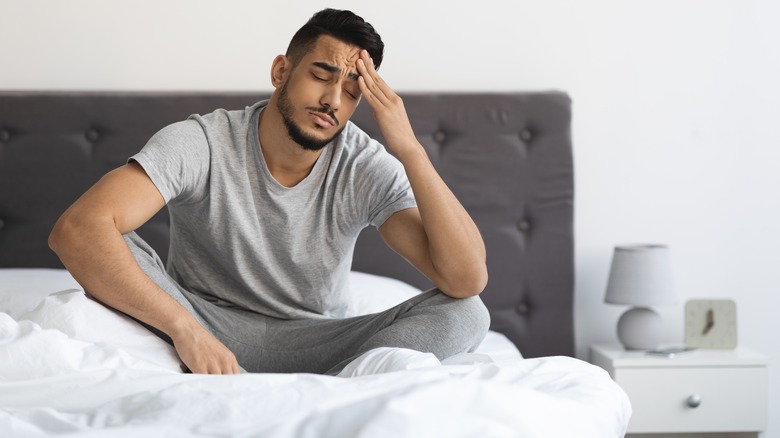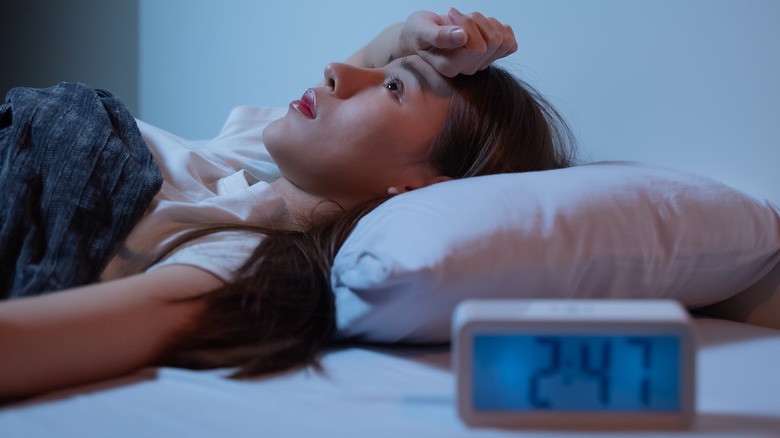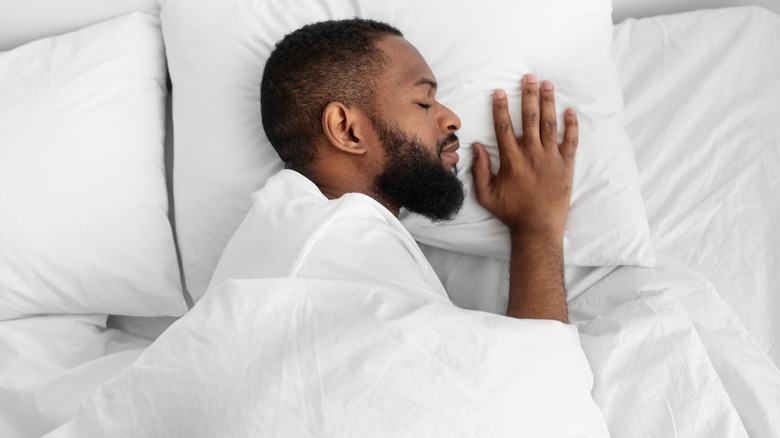Reasons You May Have A Headache After A Nap
Unfortunately, there's no one-size-fits-all answer as to what triggers a headache. For some, alcohol consumption, certain food items, or nicotine use could prompt a headache (via Cleveland Clinic). For others, dehydration, sinus congestion, sneezing, or blowing one's nose too harshly could be the culprit. But what about those who have woken up from a midday snooze to find themselves faced with throbbing head pain? Could there be a relationship between naps and headaches?
"If you're dealing with chronic headaches, or headaches that seem to appear as soon as you wake up, it could be a sleep disorder," sleep medicine physician, Nancy Foldvary-Schaefer, tells the Cleveland Clinic. Breathing problems, such as snoring, can be a sign of obstructive sleep apnea. The condition is characterized by a blockage of the airways that causes pauses in one's breathing (per Mayo Clinic). Subsequently, obstructive sleep apnea can leave us more susceptible to headaches following a nap.
The relationship between insomnia and headaches
Alternatively, a 2009 study published in the Journal of Clinical Sleep Medicine found a somewhat reciprocal relationship between naps and headaches. In a study of 32 women with tension headaches and 33 women with minor head pain, researchers used survey data to assess the ways in which subjects implemented symptom management. While relaxation, medication, the use of a hot or cold compress, and distraction techniques were among the participants' self-reported coping mechanisms, more than 80% of participants reported sleeping as their go-to symptom management strategy (via American Academy of Sleep Medicine).
However, 56% of women stated that going to sleep seemed to stimulate a headache, particularly those with insomnia, according to the American Academy of Sleep Medicine. "Insomnia is a common complaint among headache sufferers," principal investigator Dr. Jason C. Ong states via the publication. "While napping may relieve pain, it may also result in poor sleep hygiene, thus triggering sleep disturbance or perpetuating an insomnia episode." Therefore, while midday naps may help alleviate headache symptoms in the moment, they can keep us up later that night. Subsequently, the lack of sleep may prompt a tension headache the next day.
How to relieve nap-related headaches
While headaches related to a potential sleep disorder should be looked at by a doctor, others may find relief through the use of at-home remedies to help tweak their sleeping habits. Healthline emphasizes the importance of a supportive pillow. If your pillow positions your head and neck at an awkward angle, such as on an incline, this can lead to muscle tension and subsequent headaches. Rather, choose a pillow that allows your neck and shoulders to remain horizontal at no angle whatsoever.
Maintaining a constructive sleep routine may also help relieve nap-related headaches. Healthline suggests limiting one's caffeine consumption throughout the day, making time for regular daily physical activity, and keeping daytime naps at a minimum. Believe it or not, napping too frequently can also put us at risk for headaches. The Sleep Foundation suggests that adults keep naps to no more than 30 minutes, with the sweet spot being around 20 minutes to get the most attention-boosting benefits.



